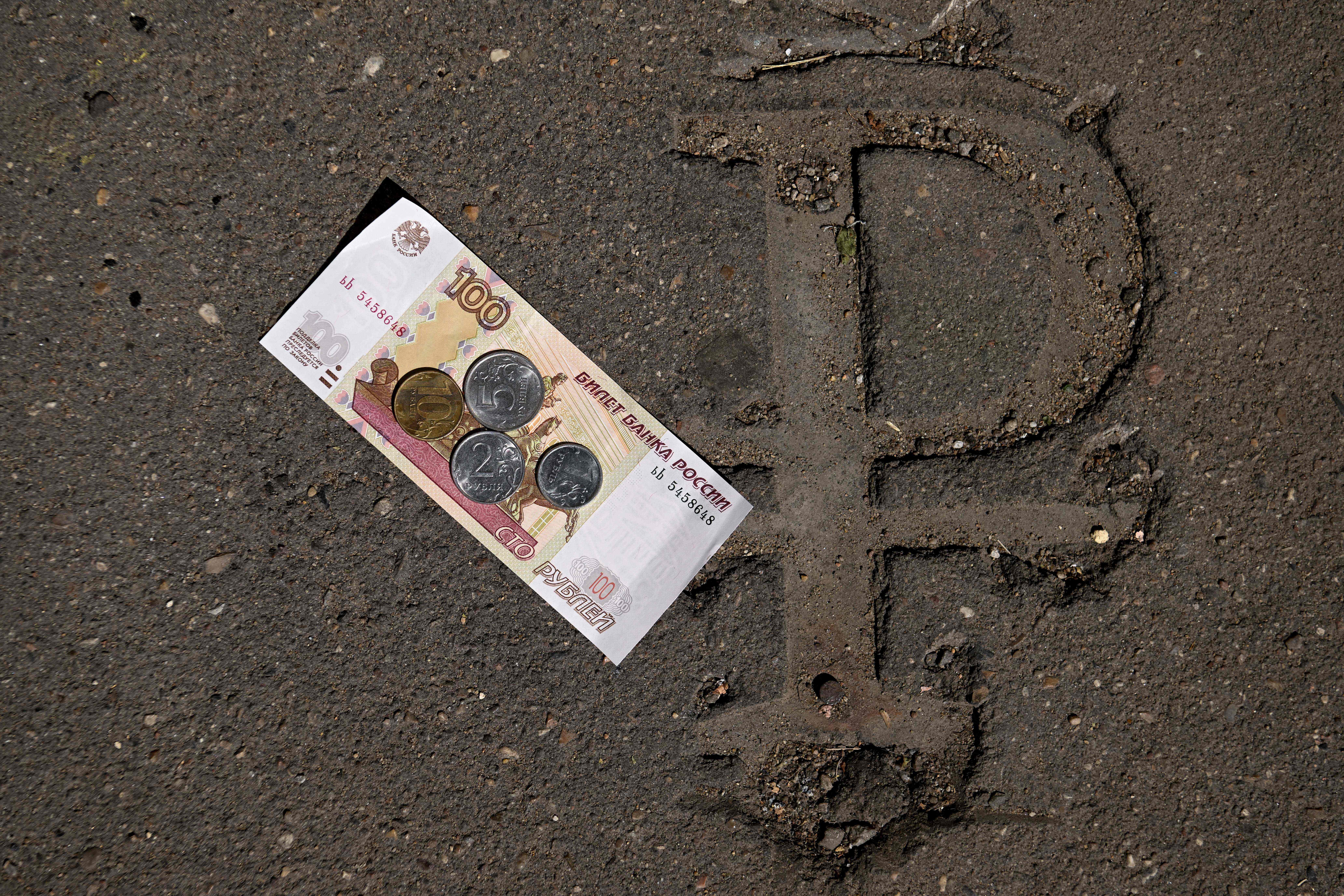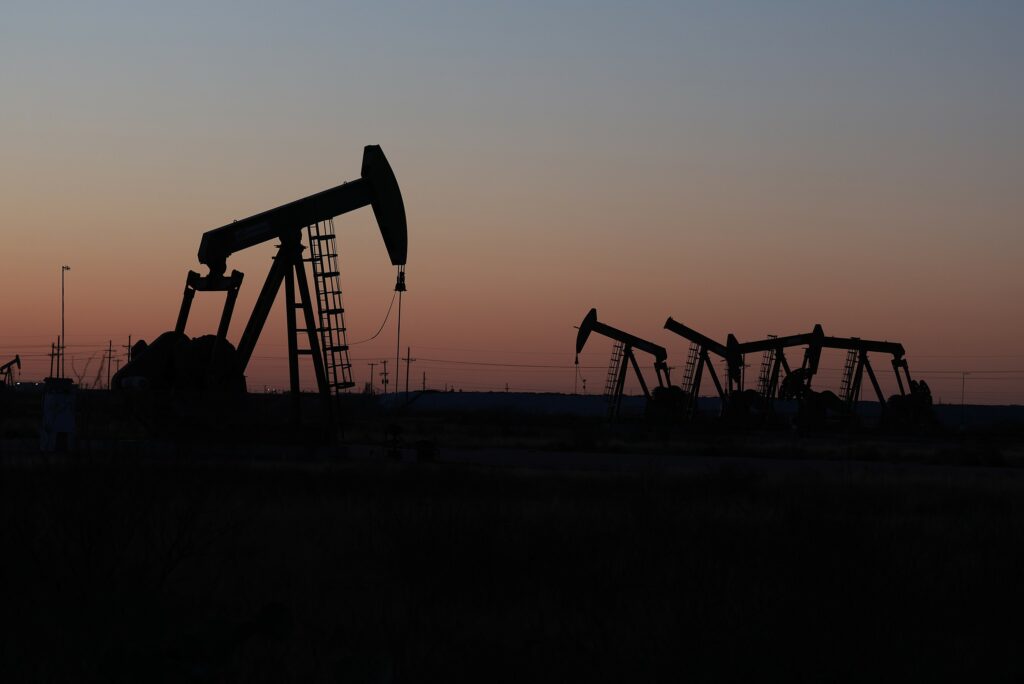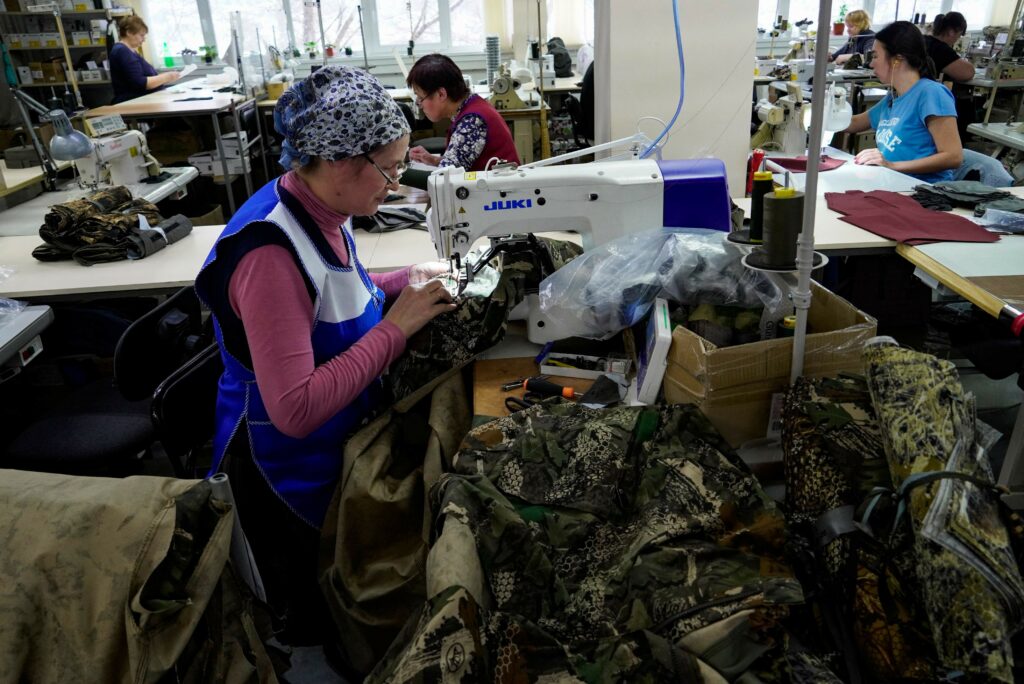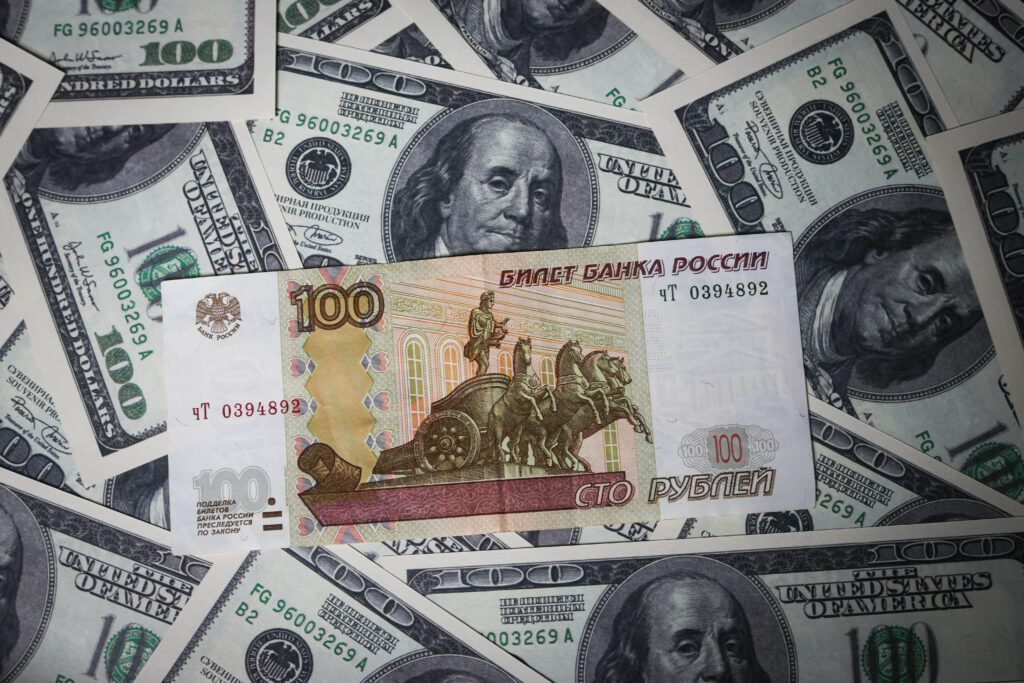«There’s no money, but hold on,”Dmitry Medvedev infamously advised Crimea’s pensioners in 2016. That remark caused much ridicule at the time. Yet as Russia is drawing up public finance plans for the key election year of 2024, the former president’s gaffe seems to have become the guiding principle for all but the military industrial complex.
Short-term thinking and the long war narrative
According to the draft federal budget to be discussed and adopted in the next few weeks, there is money available for the government, even as some of the income figures are based on optimistic, if not wishful thinking. Much of that hoped for money, for instance, assumes persistently high global oil prices at an average of 85 USD per barrel and continued economic growth at 2.3 percent. Even with a less promising outlook, the Russian government still has various ways to cover an eventual deficit, from using funds accumulated in the National Welfare Fund to introducing or raising taxes. However, the immutable political priorities of the system are generating tensions, and so are the growing differences between the aims of the federal government and lower-level budgets.
The draft budget is the most glaring example of the short-termism and magical thinking that has increasingly characterized Russian policymaking since February 2022. In 2024 defense expenditures will grow from 6.4 trillion to a whopping 10.8 trillion rubles. This is roughly three times pre-war levels and, for the first time, significantly higher in nominal terms than social expenditures. This, among other things, will include the launch of a new «national project» entitled «Unmanned Aerial Systems» under first deputy prime minister Andrei Belousov and industry minister Denis Manturov — itself a symbol of how the original, development-focused national projects, announced in 2018, lost their meaning.
The steep growth of military expenditures is envisaged while expenditures on everything else plateau or subside. Even national security budgets — including domestic law enforcement and the security services, which also experienced significant growth over the past years — will be kept roughly at level and there are no funds earmarked to raise the salaries of public servants, in a key election year. Tellingly, however, in 2025−26 the government expects to return to a «normal» amount of defense expenditures, though it is far from certain the war in Ukraine will be over next year.
The seemingly one-off spike is a manifestation of the continuation of Russia’s collective magical thinking since autumn 2022, in which every domestic political actor, from business elites to voters, is invited to accept two beliefs that the authorities’ «long war» strategy is based on: that the war is inevitable; and that victory is just around the corner as the collective West’s determination to support Ukraine falters. Alternatively, if one assumes that the government itself understands the uncertainties of the war, the spike can also mean that as Russians are invited — at least officially — to publicly endorse Putin’s war in the 2024 presidential election, the government is determined to achieve at least some military successes that can be presented as victories and reward a new pro-war coalition consisting of industrialists feeding the war machine, business elites taking control of assets inside Russia and in the occupied territories, and ordinary citizens drawing financial benefits from the war, from increased salaries to social benefits.
This, however, comes at massive long-term costs. Even as Russia’s economy is going through massive structural changes, which demand significant public investments into infrastructure development, expenditures under the «National Economy» heading are going to be cut in nominal terms for the third year in a row. Factoring in inflation, which is expected to average 7.2 percent next year, 2024 is going to see a more than 10 percent drop in real terms. Housing and urban renewal programs will also face significant cuts.
At the same time, the budget envisages, in a new government program, spending at least 651 billion rubles over three years just on the reconstruction of infrastructure and housing in the occupied territories in Ukraine, which the Russian army itself destroyed. And this is only the tip of the iceberg: even as in reality, Russia is both unwilling and unable to integrate these territories, their budgets are to receive more than 410 billion rubles in interbudgetary transfers from the federal budget this year in total — and likely a higher amount next year — as well as further billions from social costs and the pension fund, as well as from regions that were pressured to assume «shefstvo» over occupied districts. To put this into perspective, all transfers from the federal budget to Russia’s 83 regions and the five occupied Russian regions will amount to 3.2 trillion rubles next year.
Further losers will include companies expecting payments directly or indirectly associated with public investment projects that will now suffer delays or will be scrapped altogether; businesses that will face stronger scrutiny in order to shore up fiscal receipts (among other things, the draft budget envisages 440 billion rubles in various fines and 850 billion rubles of undistributed surplus and advance payments on single tax payments accounts), all while many of them are facing cadre shortages, a loss of export markets, steeper costs of exports (due both to longer routes and higher export duties) and narrower profit margins. Furthermore, due to the uncertainties associated with incomes, there is no guarantee that in 2024 the government is not going to have to come up with new surtaxes or duties, as it happened several times this year, like with the introduction of a tax on «extra profits», the new taxation of oil exports, or the introduction of sliding export duties.
How to hide a deficit
The federal budget’s all-in on the war does not mean the government has forgotten about or given up on other priorities. It simply means it expects other participants of Russia’s fiscal system or economy — regional and local budgets as well as large state-owned and private companies — to make up, if and when they have to, for the money that the federal budget will not provide directly and systematically. For the federal center this is convenient; in theory, it leaves up to regions what they do or do not spend on (in practice, priorities are set by the federal government, but, crucially, responsibility is devolved).
For regions, this means that regional budgets will need to allocate more funds on areas where the federal government is effectively making cuts but which are politically sensitive (e.g. housing renovation, health care and education). The president has also made it clear this year that he expects regions to spend more on infrastructure projects (both domestically and in the occupied territories) keep local job markets balanced and keep a tab on inflation. Regions will also have to continue raising the salaries of public employees who are paid from regional budgets, even if the subsidies that they receive from the federal budget on this will not be indexed.
Regions are drafting and adopting their budgets with some delay behind the federal budget; but already some contours of the shifting of responsibilities has been visible this year. In the first half of the year, expenditures on housing and communal services — already one of the biggest headings of regional budgets — grew by 25.1% across the board, as the government has pushed regions to address an issue that led to protests in several regions in 2023. Social expenditures went up by 18%.
Regions’ own incomes are shakier than a year ago, although this is not immediately obvious. In 2023 profit tax receipts, which had collapsed in the second half of 2022, stabilized somewhat, driven by state-induced demand through military-adjacent sectors in Russia’s European heartland. Personal income tax revenues only grew by 5% in the first two quarters (even after the federal government amended a tax reform that prioritized the federal treasury and caused disruptions in regional finances at the beginning of the year) but they recovered at the end of the summer. As of August 2023, expenditures are 13.8, revenues are 11.8 percent higher than a year before. But 2024 revenue plans build heavily on expectations of economic growth, which is far from guaranteed, and regional budgets may still face tax rebate requests from companies. Officials have circulated the idea of a tax on tourism, which would help a small number of regions that benefited from Russia’s growing isolation, but far from all.
In 2023 regional indebtedness has grown to record amounts — from 2.78 to 3.11 trillion rubles in the first eight months of the year — as regions were taking out short-term treasury loans to cover expenses as well as infrastructure loans. So far, this growth in indebtedness has been pretty manageable in most regions, because the government has, for years, been effectively reducing debt servicing costs of by replacing market loans with cheap (in real terms, free) budgetary loans. Last year, the government made it possible for regions to take out short-term loans to cover any funding shortages in the run-up to the 2024 presidential election. In a period of high interest rates, this is an important source of financing for overstretched regional budgets. Due to this policy, all while regional debt increased by 238 billion rubles in the first six months of 2023, debt servicing costs dropped. However, as of 2023 most market loans have been replaced — budgetary loans represent 76.3% of regional debt, while bank loans only 1.9% – thus there is little room to reduce regional expenditures further this way. High indebtedness, in turn, can lead to regional expenses being curtailed by the federal government — as it happened, for instance, in Udmurtia over the past year.
It is unsurprising, then, that during the first hearings on the draft federal budget in the Federation Council, three governors raised various issues suggesting that regional finances are overstretched even in wealthier regions. Vladimir Vladimirov, the governor of the Stavropol Territory asked the authorities to refrain from excessive inspections of municipal finances, which depend strongly on regional budgets, during the war in order to prevent disruptions to services that are the most likely to bother citizens. Some mayors have already complained over the past months of a lack of funds from their regions because expenditures were reallocated due to the war. His erstwhile protégé, Omsk governor Vitaly Khotsenko wanted the government to apply «special conditions» to regions that transfer most of their fiscal receipts to the federal budget, as does Omsk, while Irkutsk governor Igor Kobzev — whose region has recently become a net donor — requested the government to keep providing financial aid even to donor regions in «critical social areas». Some of these rather timid suggestions may be taken up by the federal government, but it is unlikely that Russia’s rigid fiscal centralization will be loosened. Over the past year, federal subsidies — which are provided for specific goals — grew by 22% and so-called «other transfers», which are based on individual decisions of the government, grew by 8% all while grants, which regions can use at their will, remained level. The reaction of Federation Council head Valentina Matvienko to Khotsenko’s proposal suggests that while the federal government may make more budgetary transfers possible, these will not be automatic and they will always depend on the political considerations of the hour.
The recent example of Khakassia’s elections where the communist governor was able to rally local elites around himself to prevent the Kremlin’s candidate from taking over his office, showed that tension between disgruntled regional elites and the Kremlin can evolve into tough political bargaining. But as of now, this case remains an exception. In general, the 2023 regional elections showed that most regional political machineries remain loyal and capable enough to implement the Kremlin’s will most of the time.
As the war and the related uncertainty continues, the tension between the Kremlin’s priorities and expectations reflected in the 2024 budgets will also grow. The authorities can attempt to deal with this in various ways. First, they can continue: creating a new class of elite directly dependent on and interested in the continuation of the war. Second, they can try to reduce their own dependence on regional officials and elites by relying more heavily on the language and the institutions of national security as well as on digital solutions from extended monitoring to online voting. Both of these reinforce the Kremlin’s tunnel vision: first, by reducing the opportunities of receiving direct feedback; and second, by creating a quasi-unlimited horn of plenty for a select few who will be difficult to wean off it.










